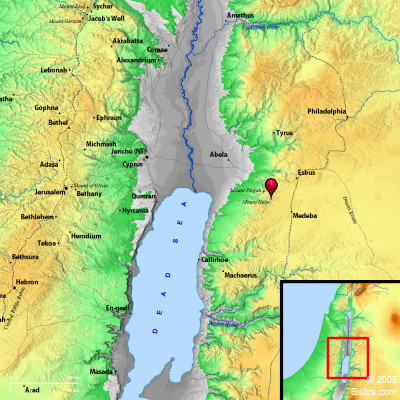Atlas  Abarim (Mount Nebo) and surrounding region Maps Created using Biblemapper 3.0 Additional data from OpenBible.info You are free to use up to 50 Biblos coprighted maps (small or large) for your website or presentation. Please credit Biblos.com. Occurrences Numbers 27:12 Yahweh said to Moses, "Go up into this mountain of Abarim, and see the land which I have given to the children of Israel.Numbers 27:14 because you rebelled against my word in the wilderness of Zin, in the strife of the congregation, to sanctify me at the waters before their eyes." (These are the waters of Meribah of Kadesh in the wilderness of Zin.) Numbers 33:47 They traveled from Almon Diblathaim, and encamped in the mountains of Abarim, before Nebo. Numbers 33:48 They traveled from the mountains of Abarim, and encamped in the plains of Moab by the Jordan at Jericho. Deuteronomy 32:49 "Go up into this mountain of Abarim, to Mount Nebo, which is in the land of Moab, that is over against Jericho; and see the land of Canaan, which I give to the children of Israel for a possession; Jeremiah 22:20 Go up to Lebanon, and cry; and lift up your voice in Bashan, and cry from Abarim; for all your lovers are destroyed. Encyclopedia ABARIMab'-a-rim, a-ba'-rim (`abharim): The stem idea is that of going across a space or a dividing line, or for example a river. It is the same stem that appears in the familiar phrase "beyond Jordan," used to denote the region East of the Jordan, and Hellenized in the name Peraea. This fact affords the most natural explanation of the phrases `the mountains of the Abarim' (Numbers 33:47, 48); `this mountain-country of the Abarim' (Numbers 27:12 Deuteronomy 32:49); Iye-abarim, which means "Heaps of the Abarim," or "Mounds of the Abarim" (Numbers 21:11; Numbers 33:44). In Numbers 33:45 this station is called simply Iyim, "Mounds." It is to be distinguished from the place of the same name in southern Judah (Joshua 15:29). The name Abarim, without the article, occurs in Jeremiah (Jeremiah 22:20 the Revised Version (British and American), where the King James Version translates "the passages"), where it seems to be the name of a region, on the same footing with the names Lebanon and Bashan, doubtless the region referred to in Numbers and Deuteronomy. There is no reason for changing the vowels in Ezekiel 39:11, in order to make that another occurrence of the same name. AB'ARIM, mts., e. of the Dead Sea and opposite Jericho. They descend from that high table land e. of the Jordan and are not strictly mountains but sloping cliffs overlooking the valley of the Jordan and the Dead Sea. They are about 3000 ft. above the level of the Mediterranean. Abarim means "passages" and it was only by these "passages" that the Israelites could descend to the plains of Jericho. Strong's Hebrew H5682: Abarim"regions beyond," a mountainous region North of the Dead Sea |



